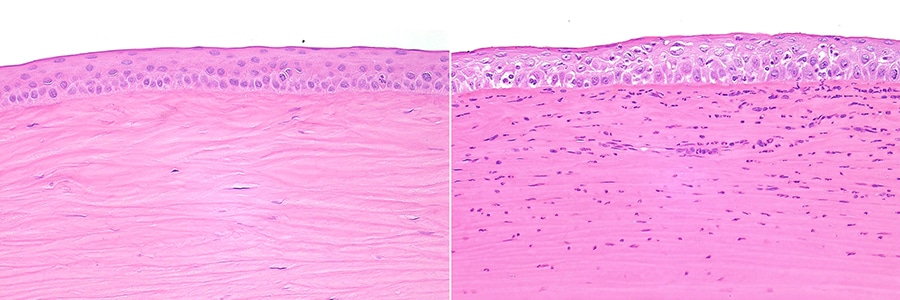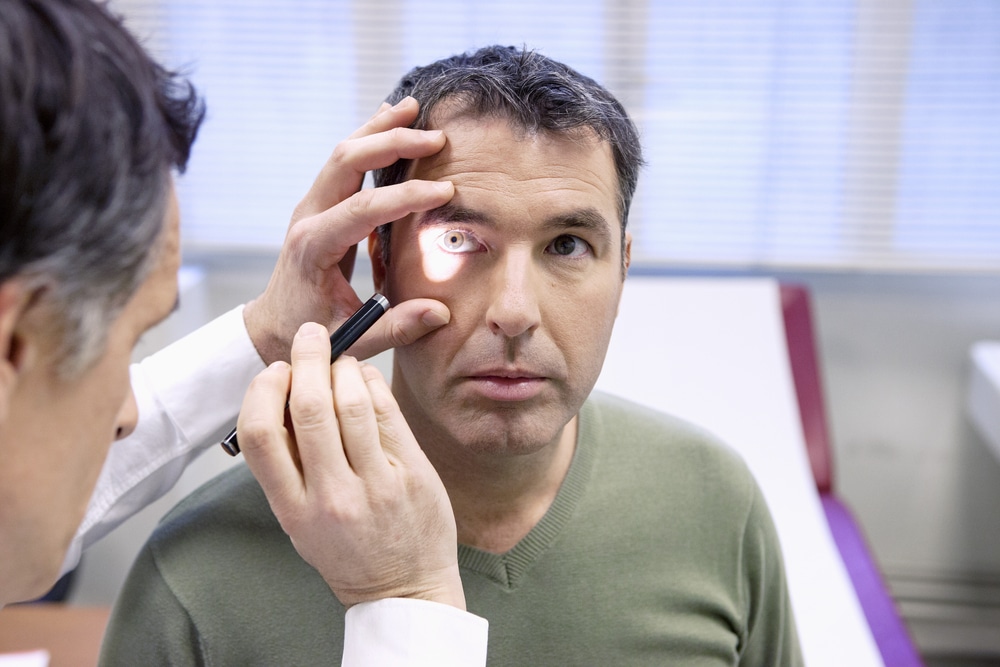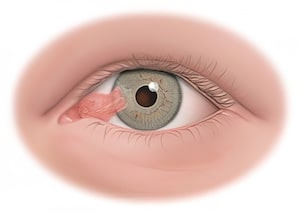At Eye Care Institute in Santa Rosa, CA, we understand the critical role your vision plays in your quality of life. Conditions like corneal erosion and pterygium can cause discomfort and impact your vision, but effective treatment options are available. Our team of seven highly skilled doctors, including board-certified ophthalmologists and an experienced optometrist, brings over 30 years of combined expertise to every patient.
With advanced training and a compassionate approach, we are dedicated to addressing your symptoms and improving your eye health. If you’re experiencing recurring eye pain, redness, or vision changes, our expert team is here to help you find relief and restore your comfort and clarity.
Recurrent Corneal Erosion
Patients with frequent early morning pain and photophobia may have a condition called a recurrent corneal erosion. These sudden spasms of pain and tearing are caused by a break in the corneal epithelial barrier.

The cause can be an old injury such as a poke from a baby’s finger or the cause may be inherited dystrophy. The treatment is usually conservative at first. If the pain persists, the cornea can be treated with various office-based procedures to eliminate the opening of the corneal surface epithelium.
A cause of mild to moderate visual blurring in patients over 65 years of age is a thickening or degeneration of the corneal basement membrane. The uneven basement membrane thickness can cause visual symptoms if it occurs over a part of the visual axis.
Corneal Basement Membrane Degeneration

A cause of mild to moderate visual blurring in patients over 65 years of age is a thickening or degeneration of the corneal basement membrane. The uneven basement membrane thickness can cause visual symptoms if it occurs over a part of the visual axis.
The condition is subtle and often escapes detection at first. Once detected, it can be easily removed in the office with scraping and the use of a rotating battery-powered micro-brush. The visual improvement can be dramatic if the degeneration bisects the visual axis of the patient.
Pterygium Eye
Pterygia are pinkish, wedge-shaped areas of abnormal tissue growth of the conjunctiva that extends onto the cornea. They are thought to be associated with repeated or prolonged exposure to ultraviolet (UV) light from the sun, since they are more commonly found in sunny climates and in the 20-40 age group. Pterygia are benign lesions that are often asymptomatic.
Sometimes, however, they can become red and inflamed, large, or thickened to the point that they become bothersome to the patient or cause visual distortion.

Often patients will complain of a foreign body sensation in the eye or for cosmetic reasons, will seek treatment of the pterygium. The best course of treatment will be determined by your ophthalmologist and depends on the size and extent of the pterygium and the symptoms it causes. Treatment can range from mild steroid drops to surgical removal of the tissue. Recently developed surgical techniques have reduced the recurrence rate of pterygia and healing time after surgery.
Preventing Recurrence and Protecting Eye Health
Protecting your eyes after corneal erosion or pterygium treatment is essential to prevent recurrence and maintain long-term vision health. Here are some tips to keep your eyes healthy:
- Wear UV-Protective Sunglasses: Protect your eyes from harmful ultraviolet rays by using sunglasses with 100% UV-A and UV-B protection, especially in sunny environments.
- Stay Hydrated: Use artificial tears to moisturize your eyes and reduce irritation caused by dryness.
- Avoid Irritants: Limit exposure to wind, dust, and smoke by wearing protective eyewear in harsh environments.
- Schedule Regular Eye Exams: Routine check-ups help detect and address potential issues early, preventing complications.
Integrating these tips into your everyday life can support long-term eye health and minimize the risk of recurrence. At Eye Care Institute, we’re here to provide ongoing care and expert advice to keep your vision at its best.
Frequently Asked Questions
Can I Drive After Treatment For Corneal Erosion Or Pterygium?
This depends on the procedure. After a minor in-office procedure, you might be able to resume driving the next day. However, after pterygium surgery or other more invasive procedures, it’s recommended to arrange transportation home and avoid driving until cleared by your doctor.
How Can I Tell If I Need Surgery For Pterygium?
Surgery is usually recommended if the pterygium is causing significant discomfort, vision impairment, or if it continues to grow despite conservative treatments. A thorough evaluation by your doctor will determine if surgical treatment is required.
What Risks Are Associated With Pterygium Surgery Or Corneal Procedures?
There are risks with any surgery, including infection, scarring, or the return of symptoms. However, modern techniques significantly reduce these risks. Your doctor will review potential risks and benefits before proceeding with any treatment.
How Often Should I Schedule Routine Eye Exams?
Even if you don’t have symptoms, adults should schedule a comprehensive eye exam every 1-2 years. Those with existing conditions, such as corneal erosion, pterygium, or other eye health concerns, may need more frequent follow-ups as advised by their doctor.
Why Choose Eye Care Institute in Santa Rosa, CA?
At Eye Care Institute (ECI), we are proud to have a team of seven highly skilled doctors with over 30 years of combined experience, dedicated to providing exceptional eye care in Santa Rosa, CA.
Our team includes Bruce P. Abramson, OD, a Fellow of the American Academy of Optometry and the Scleral Lens Education Society, trained at UC Berkeley; Daniel G. Rich, MD, former National Medical Director of Refractive Surgery at Kaiser Permanente; Nina Ni, MD, a cornea specialist and recipient of the Claes Dohlman Fellowship Award; Lillian Yang, MD, an expert in cataract surgery and glaucoma management; Arwa Alsamarae, MD, fellowship-trained in glaucoma and anterior segment surgery; Avni Shah, MD, with dual fellowships in glaucoma and global ophthalmology; and Venkatesh Brahma, MD, a neuro-ophthalmologist trained at the University of Pennsylvania.
Together, we bring compassion, expertise, and state-of-the-art technology to every patient, ensuring personalized care tailored to your needs.
Schedule a Consultation
If you tend to wake up in the morning experiencing pain with the first light of the day, you may have a condition called corneal Erosion. Please give us a call to speak with a specialist at 707.546.9800 or fill out an online form and our office will reach out to you. Thank you for choosing The Eye Care Institute of Santa Rosa!